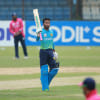The Ban on Bowlers
The banning of the bowling actions of two Bangladeshi players of the national team have not only incensed millions of Bangladeshi cricket fans but even the skipper of the Bangladesh national cricket team, Mashrafe Bin Mortaza. As an armchair 'cricket enthusiast', I would refrain from concentrating on the technicality of the rules involved here. However, if the snippets on social media of Mr. Mustafizur Rahman, a lawyer acting on behalf of the Bangladeshi Cricket Board (BCB), and the words of Bangladeshi skippers are taken, it would clearly seem fans' emotions cannot be dismissed as overreactions. The outrage of this event has to be assessed in a much broader context.
While ICC's actions in the last couple of years on many issues have defied fairness and have often favoured powerful cricketing nations at the expense of the less powerful ones, we need to understand that it is clearly a problem of the ineptitude of administrators of ICC, not of the Indian cricketing fans. Indeed, the ICC is a good example of the problems which follow when money talks and talks very loudly. In the not so distant past, the structure of the ICC had been fundamentally altered to give three Cricket Boards (Australia, England, and India) special privileges on no other reason but solely the revenue generated from these countries which did not only receive scathing criticism from many administrators, former players, and fans from outside the privileged three, but also many fair-minded ones from within. Indeed, the distinction between the 'three' and the rest has made many cricket fans feel that some of the things happening within the cricketing administration are 'not just cricket'. And naturally on-field matters which would have been brushed aside or lamented as human errors, invisible (often phantom) hands have been looked for. The farce that a man deemed to be ineligible by the Indian Supreme Court to govern his own country's cricketing administration continued to administer the ICC, did not help its image at all.
Although it would be simplistic and unfair to brand ICC as Indian Cricket Council as some overzealous cricket fans have done in frustration, it may be fair to brand ICC as the 'International Conservative Council' or 'International Conundrum Council'. ICC's action would often speak for such branding. Only recently, the ICC's schedule for the warm-up matches for the ongoing World Twenty 20, 2016 was so ridiculously arranged that Bangladesh's matches were arranged even before the final of the Asia Cup 2016 in which Bangladesh happened to be the runners-up. Thus, the ICC not so clandestinely revealed that it did not believe that Bangladesh could reach the final of the Asia Cup. It is the beauty of the game that the so-called minnows (not to imply that Bangladesh would fit this tag) on their day can surprise even the mightiest and it is pathetic that those who do not appreciate or believe in this simple fact are entrusted to run the game globally. When many other games (the example of football would be pertinent) have expanded the participation of teams in global events, the ICC has made sure that newer entrants will be eliminated as soon as possible. The appeals of cricketing legends such as Sachin Tendulkar on this issue have fallen on deaf ears.
The ICC should remember that money is indispensable but hankering for money and money only, at the expense of fair treatment for all cricketing nations, may disillusion many fans and kill the goose that lays the golden eggs. The chronic mismanagement of ICC has given millions of fans more than enough ammunition to be cynical about the fairness of its actions. Despite all its problems with corruption, football, a sport followed almost in all countries of the earth, has probably never been viewed by fans with so much cynicism on fairness in disciplinary matters.
For Bangladeshi fans, it is doubly dismaying that the BCB is not too well known for competent professional management (you would not have to go further than the ticketing circus bordering on scandals before important international matches held in Mirpur Stadium). In a city of hundreds of thousands of cricket lovers, the national cricket stadium has a capacity of only around 27,000 and often in many important international matches, a very high percentage of the tickets are unavailable for cricketing fans at large; this could in itself be testament to the lack of care that the BCB has for the cricket lovers of this country.
It is good that BCB is, so far, standing by the skipper and other players of the national team (albeit probably after being influenced by a strong stand by the skipper and other players of the team as would appear from the unequivocal words of the skipper). Of course, the administrators cannot behave the way fans can. But they should take every possible action to avenge the feeling of the players within the limits of the rules. While at this stage it may be a very long shot, assuming that the BCB does not get a fair response from the ICC once the ICC's internal mechanism is exhausted, the Court of Arbitration for Sport (CAS) in Lausanne, Switzerland should not be dismissed right away. The route to CAS, like all other arbitral bodies, is contingent on the agreement between the disputing parties (here the ICC and BCB) and can be time consuming. However, administrators have to remember that cricket is not only a game to Bangladeshi fans but also a national passion and pride.
Bangladesh need not try to flex its muscle (assuming it has any) as has been done in the SCG saga in 2008 (the New Year Test/ 2nd Test of Border-Gavaskar Trophy), but no option available within the cricketing diplomacy and rules should be left unused. Again, it is also a welcome gesture that the BCB has decided to scrutinise the bowling actions more rigorously in domestic matches. After all, in this time of despondency and suspicion, we should not detract from the fact that even our players and administrators are not very sanguine about the legality of the bowling actions of Arafat Sunny. If we had been able to install a more rigorous domestic regime, this kind of a jarring situation would not have arisen in a global event. All said and done, it is still better late than never.
Writer is an Associate Professor at School of Law, BRAC University

 For all latest news, follow The Daily Star's Google News channel.
For all latest news, follow The Daily Star's Google News channel. 








Comments